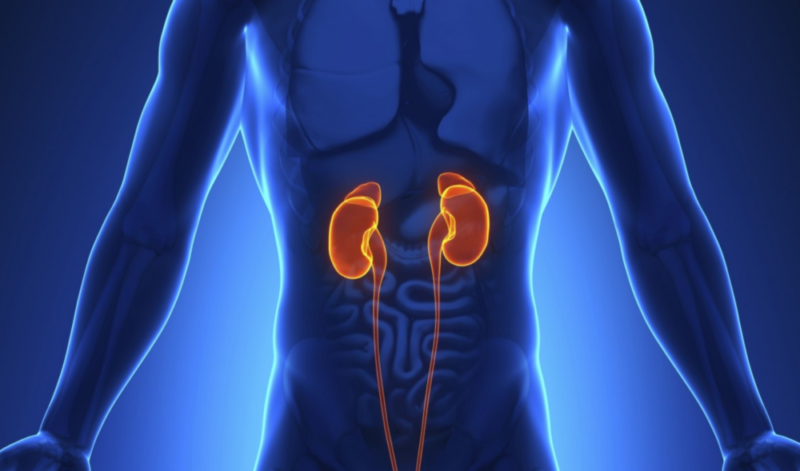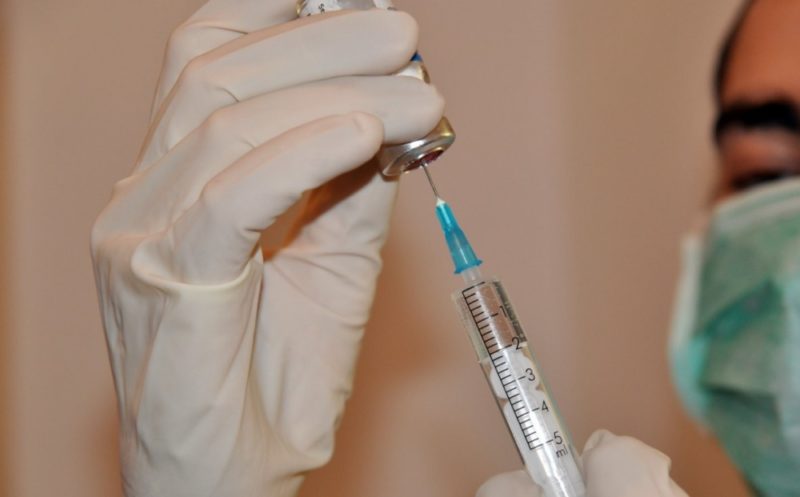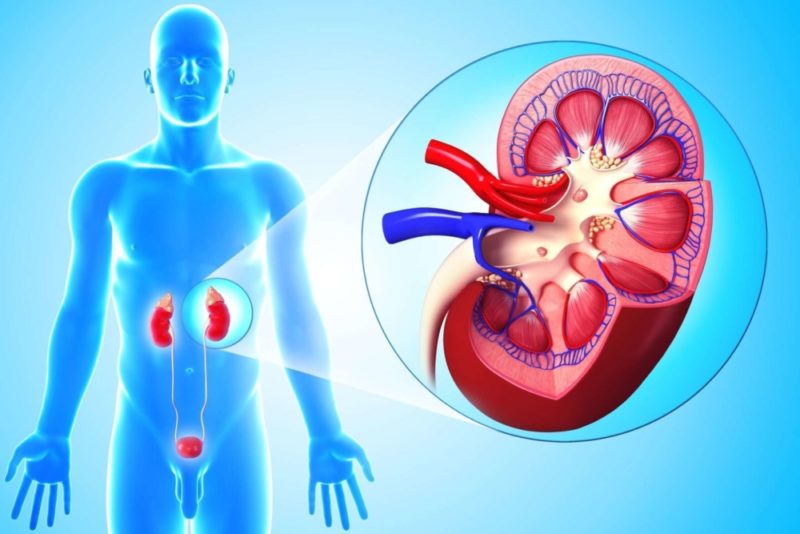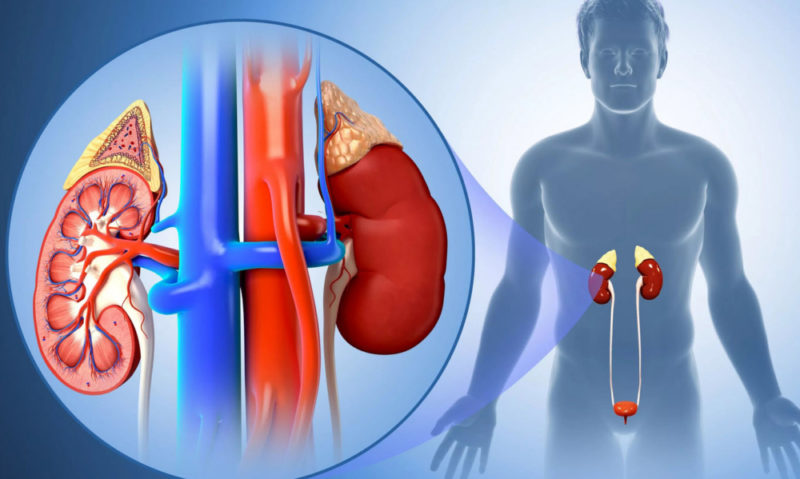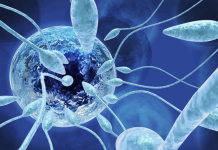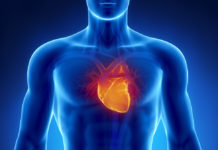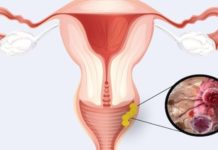According to statistics, women are 6 times more likely to suffer from kidney inflammation. However, this fate was not spared and the stronger sex. Consider the symptoms and treatment of pyelonephritis in men, as well as varieties of this disease.
Material Content:
Causes of pyelonephritis in men
With this disease, the pyelocaliceal region and functional tissue of the kidneys are affected.
Typical factors causing pyelonephritis are:
- The occurrence of foci of infection provoked by staphylococcus or Escherichia coli.
- Viral or bacterial damage to the kidneys.
- The formation of plaques or spasms of blood vessels, as a result of which the normal blood flow in the kidney is disturbed.
- Prostate adenoma.
- Urine reflux to the kidney caused by a malfunction in the urinary tract.
- Taking hormonal drugs.
- Decrease in the protective functions of the body in case of a serious disease, for example, diabetes.
- Urolithiasis disease.
- The presence of oncology.
- HIV infection.
- Abnormalities in the structure of the kidneys.
- Chronic forms of prostatitis.
- Venereal diseases.
- Urinary incontinence.
- Infections in the kidneys during their open research.
In addition, older men, people who neglect personal hygiene, and people who drink too little are at risk.
Types of disease
Based on the characteristics of the course, the disease is divided into two types:
- acute form;
- chronic form.
Acute pyelonephritis is characterized by inflammation of the entire parenchyma.It can be triggered by another kidney disease or occur on its own. Appeared small abscesses turn into a large focus of inflammation, called the carbuncle. If, when opened, its contents enter the pelvis or cup, then pus appears in the urine. After complete recovery, scars from the connective tissue form in the affected areas.
The acute form of the disease can develop into chronic pyelonephritis in men.
The reasons are:
- delayed or incorrect treatment;
- pathology of the genitourinary system;
- mutation of microorganisms spreading the disease and their adaptation to the action of drugs;
- other chronic diseases, such as obesity, diabetes mellitus or gastrointestinal dysfunction;
- weakened immune system.
An exacerbation of the chronic form of the disease can be associated with a common cold. In this case, there are three phases of its development:
- Active inflammation. A source of infection appears, and the immune system is connected to its elimination. A clinical blood test at this stage will show an increased number of lymphocytes and white blood cells, as well as an increase in ESR.
- Latent phase. An intermediate stage, which can last six months. Laboratory data are aligned, the patient's condition returns to normal. This indicates a gradual subsidence of the infectious focus.
- The phase of remission. External signs of pathology are absent. The patient feels well. The disease receded. However, if adverse factors occur, there is a risk of re-emergence of the infection.
In the latent stage, damaged areas (abscesses, abscesses) become scarred. When there are a lot of them, the body shrinks and ceases to function normally. The same process is observed with frequent occurrence of recurrent inflammation of the kidneys.
Symptoms and signs
Each form of the disease has specific symptoms.
Acute pyelonephritis:
- Heat.
- Aching or dull lower back pain, sometimes paroxysmal. Painkillers are powerless here.
- Marked pallor and a general feeling of weakness.
- Frequent headaches.
- Pain and burning during urination. Perhaps the appearance of false desires.
- Increased sweating.
- Nausea with rare bouts of vomiting.
- Change in the appearance of urine - the color becomes darker, an unpleasant odor appears.
- Sometimes urine may contain blood. This is a very alarming signal.
In some cases, the signs of pyelonephritis may differ depending on the characteristics of a particular type of bacteria.
The standard symptomatology of a chronic form is not so obvious. In this regard, the disease may not cause severe discomfort for a long time.
The main signs of chronic pyelonephritis:
- Attacks of aching pain in the region of the kidneys that occur with a certain periodicity.
- Urinary incontinence.
- Sudden jumps in blood pressure.
- Pain in the lower abdomen.
- Discomfort during urination.
If you start this pathological process, then over time it can provoke a purulent abscess of the kidneys. This is a very serious condition, requiring immediate hospitalization, and sometimes being in intensive care conditions.
Diagnostic measures
The main diagnostic procedures include:
- general urine analysis;
- blood analysis;
- Ultrasound of the kidneys;
- bacteriological culture of urine.
Ultrasound examination, in addition to the disease itself, helps to establish its causes.
Treatment of inflammatory kidney disease
The acute form of pyelonephritis requires inpatient treatment. The therapeutic regimen includes taking antibiotics. And also the patient is prescribed a special diet for pyelonephritis with heavy drinking and bed rest.
When the disease is the result of another disease, then both pathological processes are treated simultaneously.
Due to the fact that the development of pyelonephritis is often associated with weak immunity, it is necessary to strengthen the body's defenses during its treatment.Therefore, the patient can be prescribed spa treatment.
Surgical intervention is provided if the pathology is due to a congenital violation of the structure of the kidneys.
Diet and proper nutrition
In the period of exacerbation of chronic pyelonephritis and the acute form of the disease, the acceptable daily balance of nutrients is:
- proteins - 100 g;
- carbohydrates - 450 g;
- fats - 90 g.
Such a sparing food regimen should be maintained until the kidneys are completely eliminated from the inflammatory process.
Experts recommend introducing more dairy products into the daily diet.
In addition to the diuretic effect, it normalizes the intestinal microflora after taking antibacterial drugs for the treatment of pyelonephritis. Food should contain amino acids and easily digestible proteins.
Traditionally, for any kidney disease, a therapeutic diet is prescribed - table number 7.
The menu for one day on this system will be something like this:
Breakfast:
- Buckwheat milk porridge.
- Bread and butter.
- Tea.
Lunch:
- Steamed omelet.
- Any seasonal fruit.
Dinner:
- Lenten soup with vegetables.
- Braised veal.
- Pounded potatoes on a side dish.
- Fresh juice.
Snack:
- Cottage cheese casserole.
- Vegetable salad.
Dinner:
- Pasta with cream sauce.
- Seafood platter.
Before going to bed, you can drink kefir, fermented baked milk or milk with a bun.
Possible complications
If it was not possible to timely detect the disease and begin its treatment, then it can lead to the following consequences:
- impaired functioning and renal failure;
- increase in protein levels;
- swelling of the body;
- abscess;
- development of a chronic form;
- the beginning of the inflammatory process in the genitourinary system.
And also, if bacteria that cause kidney pathology enter the bloodstream, blood poisoning can begin.
Prognosis for recovery
Despite the frightening symptoms and severe consequences, it is possible to cure the disease in any form. Subject to all the prescriptions of the nephrologist, including a therapeutic diet, there is a chance to forget about the unpleasant manifestations of the disease forever, without fear of remissions in the near future. However, therapy will have to take a lot of time. A working patient will need a sick leave to complete a full course. After timely and proper treatment, the kidneys will recover and continue to function as before.
Prevention
Doctors recommend that you follow some rules to reduce the likelihood of kidney pathology:
- Annual prophylactic examination of the prostate.
- Refusal of bad habits - alcohol and nicotine weaken the protective functions of the body.
- Treatment of urolithiasis immediately after its diagnosis.
- Stay cool in the cold to prevent hypothermia.
- Exclusion of too fatty foods from the diet and minimizing the use of salty and fried foods.
- Personal hygiene.
- Refusal of promiscuous sex life.
- Timely emptying of the bladder.
- Maintaining water balance in the body thanks to two liters of water drunk per day.
- Maintaining a healthy lifestyle.
- Taking vitamin supplements as needed.
Pyelonephritis is a serious disease, the correct treatment of which guarantees the normal functioning of the kidneys in the future. Therefore, adhere to the recommendations listed and do not neglect visits to the doctor.


